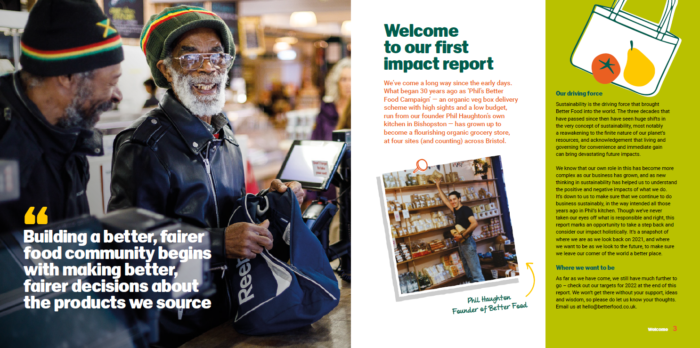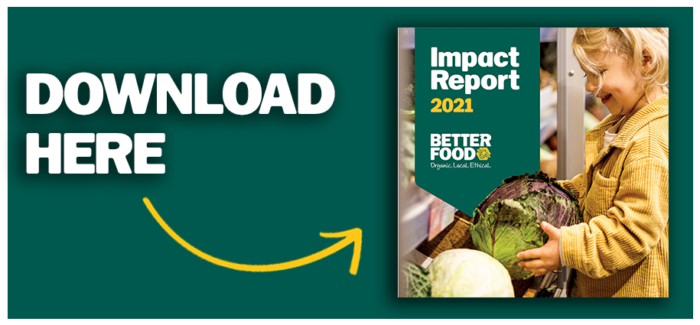A look inside our first impact report
Download our new Impact Report. Our new Impact Report gives an honest and open insight into where we are as we look back on 2021 and where we want to be as we look to the future.
Danni Rochman is our Ethical Sourcing Coordinator. As well as vetting all new suppliers’ ethical credentials, she’s been collating and writing Better Food’s first impact report. Released in February 2022, the report captures a snapshot of where we are and where we’d like to be in terms of our impact on people and planet. Here, Danni takes a look at the highs and lows, and plans for the future.
30 years and four Bristol stores after Better Food first came to life in the kitchen of our founder Phil’s Bishopston home, we’ve taken a step back to consider our impact. It can be easy for a small business like ours, which was founded with sustainability at its heart, to take for granted that we’ll always stay true to our mission; but the world and our business have shifted in ways we couldn’t have imagined three decades ago, and it’s important to make sure that our activities are positively contributing to a shifting definition of ‘sustainability’ itself.
Our values – Organic, Local, Ethical – offered a good starting point to begin to look at the positive impact that we’re working to make. The three words capture a great deal of what guides our decisions front and back of house, so it seems right to measure ourselves against them to see what we’re achieving in each domain, and where we can do more.
The good news is that our teams are doing a lot to bring these values to life. We’ve maintained our organic certification as a business since 1997 (meaning we can sell unpackaged organic goods and still call them organic, and make our own organic items in the kitchen). We prioritise organic across nearly all our ranges, meaning that we’re able to offer perhaps the widest range of organic products in Bristol, and on some lines – such as wine, teas and coffee – the entire offer is organic. As much as 99% of our fresh produce is certified organic. We know that choosing organic is having a meaningful impact as far as the organic farms are concerned, where, on average, plant, insect and bird life is up to 50% more abundant than their conventional counterparts [Source: Soil Association].
Our impact locally isn’t confined to just our sourcing (though 64% of the products we sell are sourced from suppliers within 50 miles of Bristol); we’re having an impact through our people too. Around 150 local people are employed at Better Food. In 2021 we achieved our ambition of becoming a Living Wage Employer, recognising that we pay our staff the real Living Wage or more, as opposed the lower government National Living Wage.

When it comes to our ethical impact, this slightly nebulous word influences much of what we do and the decisions we make. In sourcing products for our shelves, we look not just at organic certification, but also at packaging, use of palm oil, Fair Trade schemes, and even suppliers’ support of community initiatives. One of the ways we’ve committed to increasing our ethical impact beyond our stores is through our own community initiative, Better Giving. Our store teams, each with an initial budget of £1000 to support their efforts, are raising funds for a customer-voted local charity: Houria, The Green House, SARI, and a fourth still to be nominated for our new Gloucester Road store. We’ve installed Good Box donation points in each store to make it easy for our customers to show their support.
Taking a look at our impact across our values also served to highlight where we could be doing better. We’ve seen that there’s a need to go that extra mile to source organic where is matters most, setting ourselves the target of increasing our meat range from 79% organic to 85% in the next year. We’ve also seen our waste creeping up as shopping patterns have changed in the past year, tipping just over 2% by stock value. Our teams have already set about finding ways to get this back down, including making more use of the Too Good to Go app in cafés, which alerts app users to reduced café items at the end of the day. We’ve set ourselves ten firm targets, laid out in the report, to reach by the end of 2022, but making the report has given us food for thought to improve our impact beyond just these ten goals.
In the words of our founder, it’s “critical that we and all businesses take a lead on changing our ways in order to minimise our negative and enhance our positive impacts”. Thirty years ago, this mission seemed straight forward, but today our understanding of the complexity of what it is to be sustainable means that we need to dive much deeper into everything we do. The greatest opportunity presented by the impact report is as a firm starting point from which we can begin to measure our impact – the only sure way we can consistently improve, hold ourselves accountable, and uphold our organic, local and ethical values, and leave our small corner of the world better than we found it.

